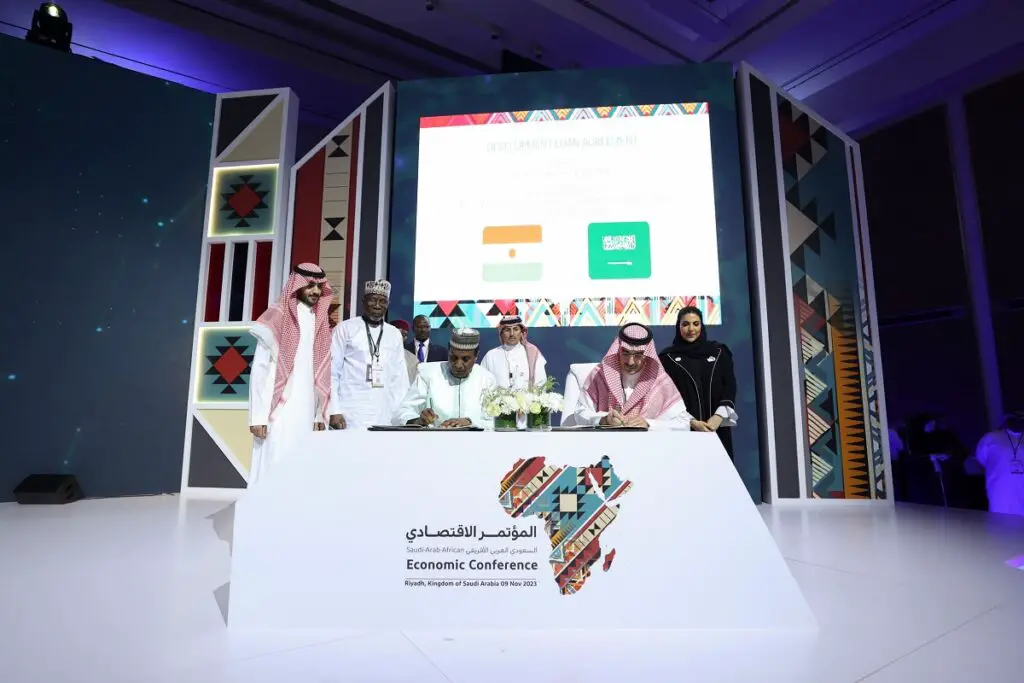- Saudi Fund loan will help improve access to healthcare, education, water, transportation, and economic opportunities.
- Target projects address a wide range of the UN Sustainable Development Goals (SDGs) in 12 African countries.
- Across the African continent, the Saudi Fund has financed over 400 projects worth $10.7 billion in 46 countries.
In the ever-evolving world of global finance, oil-rich Saudi Arabia is emerging as a pivotal thread, weaving a narrative of economic collaboration and strategic partnerships. As the Saudi Fund for Development (SFD) unfurls its wings, it has inked a historic $580 million loan agreement with 12 African countries, marking a significant stride in the kingdom’s expanding role on the world financial stage.
Against the backdrop of evolving dynamics, where traditional financiers, especially China, are reassessing their commitments, Saudi Arabia’s ascent becomes a compelling tale of financial diplomacy, poised to reshape the contours of international economic relations. Saudi Arabia is positioning itself not just as a regional powerhouse but as a global player influencing the trajectory of world finance.
In Africa alone, the Saudi Fund has financed over 400 projects worth $10.7 billion in 46 countries.
Saudi Fund loans $580M to 12 African countries
The SFD Chief Executive Officer, H.E. Sultan Al-Marshad, has signed 14 new development loan agreements with 12 African ministers, worth over $580 million, to fund healthcare, water, education, and transportation projects. In the deal, the target countries include Angola, Burkina Faso, Benin, Burundi, Cabo Verde, Guinea, Malawi, Mozambique, Niger, Rwanda, Sierra Leone, and Tanzania. (Alprazolam)
The signing ceremony occurred at the Saudi-Arab-African Economic Conference in Riyadh, Kingdom of Saudi Arabia. In conjunction with the loan agreement signing, the Saudi Fund CEO signed a Memorandum of Understanding (MoU) with the African Finance Corporation‘s CEO, Mr. Samaila Zubairu.
This MoU will enable the Saudi Fund to collaborate with AFC to identify, develop, and co-finance infrastructure and industrial projects across the continent.
The development loan agreements include constructing and equipping a mother and child referral hospital in Guinea for $75 million. A Riyadh Referral hospital will be set up in Sierra Leone for $50 million, while boarding secondary schools for girls will be built across Niger for $28 million. The loan will also finance the construction of the Higher College For Teacher Preparation and the Scientific Secondary School Project in Benin for $40 million.
King Khalid University Hospital in Burundi gets $50M
In addition, the agreements include the Rehabilitation of the King Khalid University Hospital in Burundi for $50 million, the Manga Regional Hospital (Phase 2) in Burkina Faso for $17 million, and Watersheds in the Islands of Santiago, Saint Antao, and Boavista, Cabo Verde for $17 million.
Furthermore, the Saudi Fund will finance the Catumbela Industrial Development Project (Phase 1) in Angola for $100 million. A total of $20 million will expand the transmission and distribution water system project in the East of Kigali, Rwanda. What’s more, the construction and rehabilitation of the Mangochi-Makanjira Road in Malawi will get a $20 million shot in the arm.
Other agreements include constructing and equipping five hospitals in different regions of Mozambique for $50 million. A further $50 million will go into constructing the Muera Dam in Mozambique. The financing will also be channeled to rehabilitating and upgrading Two parts of National Road No. 1 in Mozambique for $50 million. Lastly, the Benaco-Kyaka Transmission Line Project in Tanzania will get a $13 million allocation.
Read also: Stop Securing Loans with Natural Resources, AfDB Urges Africa
Target Projects Address United Nations SDGs
These agreements and the MoU will positively impact the lives of millions of people in different African regions. The Saudi Fund will help improve access to healthcare, education, water, transportation, and economic opportunities, stimulating economic growth and creating jobs.
Importantly, these projects address various UN Sustainable Development Goals (SDGs) priorities, including poverty, health, and education. Other SDGs goals set to benefit include gender equality, water and sanitation, decent work, economic growth, industry, innovation, infrastructure, inequality reduction, sustainable cities and communities, and climate change.
Sustainable development
On this occasion, the CEO of SFD, H.E Sultan Al-Marshad, said: “The SFD is proud to continue partnering with African countries through contributing towards supporting development projects that will have a tangible impact on the lives of millions of people. We are progressing towards a brighter and more equitable Africa with these new agreements and MoUs.
By contributing to healthcare, education, water, and transportation projects, we are supporting the empowerment of millions of people to reach their full potential and build a more sustainable and economically prosperous continent for future generations.”
In line with its mission to promote global sustainable development since 1975, SFD has funded over 800 development projects worth $20 billion in over 100 countries worldwide. Saudi Fund’s $10.7 billion financing in Africa accounts for 57 percent of SFD’s funding in developing countries worldwide.
